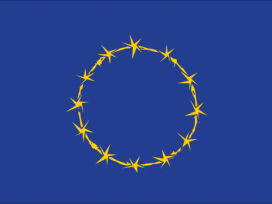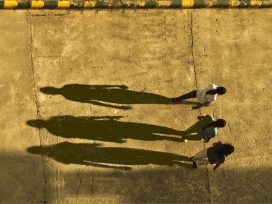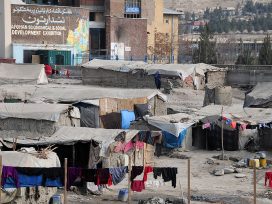Wojciech Przybylski: We often tend to focus on the geopolitical and economic causes of mass migration. Are there any cultural changes that have made migration possible on the scale we’re currently witnessing?
Ivaylo Ditchev: People are less attached to the places, religions and cultures in which they were brought up. The theatre of group identities is still performed by some “righteous” parties and religious organizations, but in general we are becoming more and more singular. The contemporary individual has a culture instead of being part of a culture. Culture has become a possession, like a car or a music track, and it follows you wherever you go. That is why we can choose places more easily, as if we lived in a marketplace of belongings. Nowhere has this been easier to effect than in the European Union, which declares freedom of movement of goods and peoples as one of its founding principles.

Photo: hxdyl. Source: Shutterstock
Choice is a crucial component of our modern culture. When you choose a particular place to live, because the climate is nicer there, as are the political and economic conditions, you inevitably influence politics, which up until now were linked to the territory. In the past, there was a fatalistic sense of belonging to the soil where one’s ancestors were buried. People considered borders as things to defend and die for. Today we all choose identities from the market of belongings, and politics has become a matter of individual consumer choice. Politicians became managers of flows, luring desirable populations, for example a creative class, to the city.
The origin, background and identity of newcomers is of little or no consequence?
This is the main issue. Extreme right parties in Bulgaria want to attract ethnic Bulgarians from Besarabia or Macedonia. But those people are not interested in coming to Bulgaria so much as to a more economically prosperous place. Others cry “We don’t want Muslims, we want Christians”. And finally: every government wants rich and educated people. Many places in the world, whether Bulgaria or the United States, would happily grant citizenship to people who can invest more in the country. This is the reason why we have a different type of politics now. States have become enterprises, which somehow manage these flows of people, and citizens become consumers of the services provided by the state.
Is this change of politics a good or a bad thing?
I have grown up in a different world, so this new situation makes me a bit uneasy. But there is no way back. I certainly do not see any. Were we to go back, we would once again have to consider dying for the motherland and accept the dimension of violence in society. One of the things that has happened is that the modern world was pacified by trade and globalization, among others. Of course this does not mean there are no wars. But wars nowadays are considered illegitimate, they are not a natural part of the system. You cannot imagine establishing a new sovereignty by means of war today, hence the scandal surrounding the annexation of Crimea by Russia. But previously, for thousands of years, questions of sovereignty and borders were settled through war.
We cannot go back, but we need to consider the trap of satisfied desire that we fell into. Liberty is not only a good thing; it can also be a bad thing. The social scientist Albert Hirschman compared East Germany and the People’s Republic of Poland in his research, where he sought to explain the lack of resistance in East Germany. His argument was that people in East Germany had the option to leave the country and the government even received payment from West Germany for each person in accordance with a complex price list. So people who were dissatisfied left. And the situation calmed down. Whereas in Poland there was no second Polish state to emigrate to, people had to stay. Since they wanted to improve their condition, they fought. The easier it is to leave, the less motivation you have to voice opposition; in fact Hirschman takes this model from consumer behaviour – you leave the shop in which they don’t serve you and you go to another instead.
Five million people leaving Syria now means that we have five million less citizens who would otherwise create a normal, democratic state in the near future. This is alarming. Today’s citizen-consumer, someone who is shopping for a better, more inhabitable place, is pragmatic and does not have that much feeling for the ideals of democracy and solidarity. Of course there is war and the European community should help, but war is also an occasion for a great number of these people to leave and look for a better life. Under communism the majority of those “fleeing to the West” were not political dissidents, and only presented themselves as such in order to be able to chose a better shop, sorry, citizenship. But then, sending them back home would have meant sending them to prison as traitors of the motherland.
Unfortunately, a migrant is more docile. Bulgarian migrants in Germany rarely participate in collective movements or strikes. They are not interested in politics. Of course they have more important questions to settle: finding an apartment and a job. But their disinterest significantly lowers overall standards of citizenship. Mass migration lowers citizenship standards because migrants are more submissive due to their precarious circumstances. Let me give an example: you wait for a document permitting you to stay legally in the country. Whilst you wait, you don’t want to be noticed. You always have your ticket when you ride a metro, because – in your opinion – even a minor offence can attract the negative attention of the authorities. Therefore you strive to be invisible. You don’t speak, so you don’t have a voice, as the psychoanalyst Julia Kristeva suggested. For as long as the migrant’s experience of being mute lasts, she cannot raise her voice or claim her rights. Mass mobility might be seen as a big machine that produces submission.
Was the Schengen area, a free-movement area in Europe, a mistake?
Schengen is a mistake just as the euro is a mistake: creating a common currency without the central Ministry of Finance is just the same as establishing a common area of free movement without the central Ministry of Internal Affairs and common border control. Either one adopts common institutions, or Schengen falls apart. Unfortunately federalist ideas are not fashionable today and only catastrophes may prompt us to move forwards.
We are also on the leash of technology.
Modern technologies have led to much more serious border control. The population is constantly supervised, but this control is often implicit, one is hidden in big data, but if they want, they can find you. We saw this on September 11: the information was all there, but the human capacity to analyse it wasn’t, and for the moment machines cannot deal with singular, illogical events. Social control is not at all obsolete, the problem is whether it is viable in a society on the move to the extent that we were talking about.
So you suggest we should keep borders, but citizens should have greater control over them?
Borders are not bad, they protect, they are the foundation of political entities, they not only separate but also link peoples. The French philosopher Étienne Balibar said that “We cannot abolish borders, we should democratize them”. We should make the borders a matter of public debate and decide where borders should be, what we want them to be. For instance: should we be monitored by our telephone provider? There has been no public discussion about it. And I am not sure that there would be a majority of people against it. They may be convinced that such control is permissible for the greater good, for instance to fight the mafia. However, this issue should not be decided arbitrarily by the ones in power, but by the citizens. When you build a house, you decide whether to put up a fence or not.
In the Czech Republic some eighty per cent of the population were against admitting migrants. This popular attitude may go against the state interest, and therefore against the interest of its citizens.
Let’s see what happens when a country closes its borders. Perhaps trade stalls when the free movement of people is put on hold, and the country enters economic crisis. Perhaps people should learn this painful lesson, and then think again. The small nations of central and eastern Europe take global exchange for granted. Cut them off from the rest of the world for a while and see what happens. Some Greeks boasted that the Russians and Chinese will save them – yet another manifestation of this idea that you can chose the better provider.
Public discussion means that you take into consideration the positive, but also the negative side of borders. There is a famous description of an ideal polis in Aristotle’s Politics. The ideal polis, says Aristotle, should be a place that is easy to leave, but difficult to enter. It should be difficult for enemies to access the city, but it should be easy for citizens to get out. So there is a little bit of the asymmetrical fantasy here that everybody has about their living space: I want to go out, to do tourism, work abroad, but I don’t want the others to come. In this sort of discussion, people should be confronted with different possibilities and different consequences. What happens if we close the borders? What if Bulgaria brings back the communist border? Let us give it a try for a year if you want. For a month.
Is this the revenge of geography?
Geography has always been there. Some say that the rise of technologies of global transportation and communication has abolished geography. But it still matters. Inequality is more and more geographically based. Just consider how much you would earn for doing the same job, sweeping streets say, in Zurich as compared with Karachi.
Geographical determination has become a new form of inequality. We fight inequalities that stem from perceptions of race or our family background, but those based on geography seem natural. Just stay where you are, you have adapted naturally to this climate, to this dictatorship.








